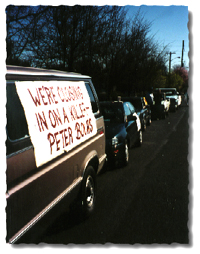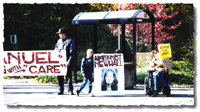































|
 May/June, 1998 Volume XII Number 12
May/June, 1998 Volume XII Number 12


Life Advocate editor no "stalker," court says
Salem, OR -- The Oregon Court of Appeals reversed a lower court ruling that Paul deParrie, editor-in-chief of Life Advocate magazine, was a stalker.
On February 18, a three-judge panel unanimously agreed that the civil stalking statute had been unconstitutionally applied to deParrie because his actions did not constitute "a threat or something that does not differ meaningfully from a threat" when he conducted two peaceful pickets outside the home of Portland abortionist Jude Hanzo.
"It goes to show that you can't lose'em all," said deParrie gleefully. "This ruling will not allow the abortionists to stop speech just because it makes them uneasy."
DeParrie, 48, represented himself both at trial and on appeal and was surprised with the suddenness of the victory.
"The decision was a slam-dunk for the First Amendment," he said. "They skipped all the technical arguments and went straight to the Constitution."
The court also ruled that an appeal in this case is de novo (new) -- in other words, the court considered all the facts of the case over again rather than just considering possible procedural errors of the lower court. For this reason, the court's opinion reviews all the charges and relevant testimony.
The suit was first filed in March of 1996 after deParrie had finished an 18-month long campaign of picketing one abortionist's home per month. Hanzo, who no longer works for the abortion clinic but is still its registered agent, claimed that the "violent context" -- the shooting of abortionists and the statements of support for the moral justifiability of the use of force -- of the abortion debate could be used to show that she was in "reasonable fear" of deParrie. The Court of Appeals disagreed saying that, if such a reasoning were accepted, deParrie would be prohibited from "any protest/picket activity directed, not just against [Hanzo] and her clinic, but against any abortion provider. [The stalking law] does not, and cannot, yield that result." (Emphasis in the original.)
 DeParrie's case was assisted by the California-based group, Life Legal Defense Fund, who paid for the court transcripts and whose attorney provided some legal advice. Other groups such as American Center for Law and Justice (ACLJ) and Rutherford Institute declined to become involved in deParrie's case in trial court but ACLJ and Catholics United for Life joined in an amicus brief at the appeals court level.
DeParrie's case was assisted by the California-based group, Life Legal Defense Fund, who paid for the court transcripts and whose attorney provided some legal advice. Other groups such as American Center for Law and Justice (ACLJ) and Rutherford Institute declined to become involved in deParrie's case in trial court but ACLJ and Catholics United for Life joined in an amicus brief at the appeals court level.
"There was simply no way for me to pay for those transcripts without Life Legal Defense Fund's help," said deParrie.
DeParrie noted that other individuals had assisted in preparing the case as well.
DeParrie had also approached the American Civil Liberties Union (ACLU) and other civil liberties attorneys in the Portland area to no avail.
"Hanzo's attorney is on the board of the local ACLU that decides which cases they will represent," noted deParrie wryly. "There's not much mystery why -- other than being pro-life -- that they declined my request."
In addition to the obvious victory, attorneys accross the country are optimistic that the ruling's stark denunciation of the "violent context" theory will help to get cases dismissed. Other pro-lifers currently facing stalking charges in other states believe the ruling may be a landmark.
"I've gotten requests from all over for copies of the ruling," said deParrie. "Pro-life attorneys are very excited."
What the Oregon court ruling might mean
The activities in which Paul deParrie was engaged are common anti-abortion tactics. Across the country, abortionists are suing pro-life activists under the theory that these activities constitute a "threat" because of the "violent context" of the abortion debate. They cite shootings, arsons, bombings, and public declarations by some activists which seem to support these activities as creating this "violent context."
 Using this theory, pro-abort attorneys advance this as a bolster for Freedom of Access to Clinic Entrances (FACE), Racketeering Influenced and Corrupt Organizations (RICO), harassment, intentional infliction of emotional distress, stalking, and other charges.
Using this theory, pro-abort attorneys advance this as a bolster for Freedom of Access to Clinic Entrances (FACE), Racketeering Influenced and Corrupt Organizations (RICO), harassment, intentional infliction of emotional distress, stalking, and other charges.
Currently abortionists are suing other pro-life groups and national leaders under this theory of law. The Hanzo v. deParrie opinion could have an impact on those suits.
The tight reasoning of the Oregon court's opinion could prove useful in other places where similar "violent context" arguments are being made.
The Oregon court stated clearly that to accept the argument that a violent context made otherwise non-violent activities into threats would preclude pro-life activists from any protest against any abortionist or clinic.
This opinion could be adapted by pro-life attorneys and pro se litigants in their own respective cases. The fact that the court reiterates many of the facts of the case will be helpful in such adaptation. For this reason, Life Advocate believes it was important to reproduce here the entire court opinion.
OTHER
COVER
STORY
ARTICALS
Life Advocate editor no "stalker," court says
What the Appeals Court said
The opinion of the court

|
|




